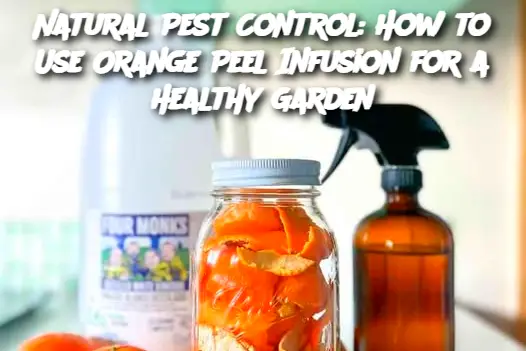Application Frequency: Apply the spray every 3-4 days, especially if you’ve had a heavy rain, as this may wash away the solution. During the height of pest season, it’s important to maintain a consistent spraying routine.
Spray Early Morning or Late Afternoon: For optimal effectiveness, spray the solution during the early morning or late afternoon. Avoid applying it during the hottest part of the day to prevent burning the plants or stressing them out.
Be Mindful of Sensitive Plants: Some plants, particularly delicate flowers, may be sensitive to certain homemade sprays. Test the solution on a small section of the plant first to ensure it won’t cause damage.
Variants:
Lemon Peel Infusion: If you don’t have oranges, lemon peels work just as well. The citric acids and essential oils in lemon can deter pests in a similar manner. Use the peels of 2 lemons instead of oranges for a different but equally effective solution.
Add Essential Oils: For an added punch, consider adding a few drops of essential oils like lavender, peppermint, or eucalyptus to the orange peel spray. These oils are natural insect repellents and can enhance the potency of your pest control solution.
Citrus and Garlic Spray: For a more robust solution, you can add crushed garlic to the orange peel infusion. Garlic has strong natural insect-repellent properties, and the combination of citrus and garlic is especially effective in keeping pests like aphids and whiteflies away.
FAQ:
Q1: Can I use this solution on all my plants?
A1: While orange peel spray is safe for most plants, it’s always best to test a small amount on a single leaf before applying it to your entire garden. Some sensitive plants might react poorly to citrus-based sprays.
Q2: How often should I apply the orange peel spray?
A2: For best results, apply the spray every 3-4 days. If you experience heavy rainfall, reapply the solution as the rain might wash it away.
Q3: Can I use orange peel spray on indoor plants?
A3: Yes, this solution is safe for indoor plants as well. However, be cautious when spraying near indoor furniture or walls, as the solution may leave a residue. Ensure the room is well-ventilated when spraying.
Q4: Will the orange peel spray harm beneficial insects like bees?
A4: When used appropriately and in moderation, orange peel spray is unlikely to harm beneficial insects. However, to avoid affecting pollinators, apply the spray early in the morning or late in the afternoon when bees are less active.
Q5: Can I make a larger batch of the orange peel solution and store it?
A5: Absolutely! You can make a larger batch and store it in a sealed container or spray bottle. Just be sure to keep it in a cool place or the refrigerator for optimal shelf life, typically up to a week.
Conclusion:
Orange peel-infused water is a fantastic natural solution to keep your garden free from pests while maintaining a safe environment for plants, pets, and people. With just a few simple ingredients, you can make a powerful, chemical-free spray that keeps harmful insects like aphids, slugs, and fruit flies at bay. Plus, the process is easy, eco-friendly, and gentle on your plants. Give it a try, and watch your garden thrive without the need for harsh pesticides!
ADVERTISEMENT

